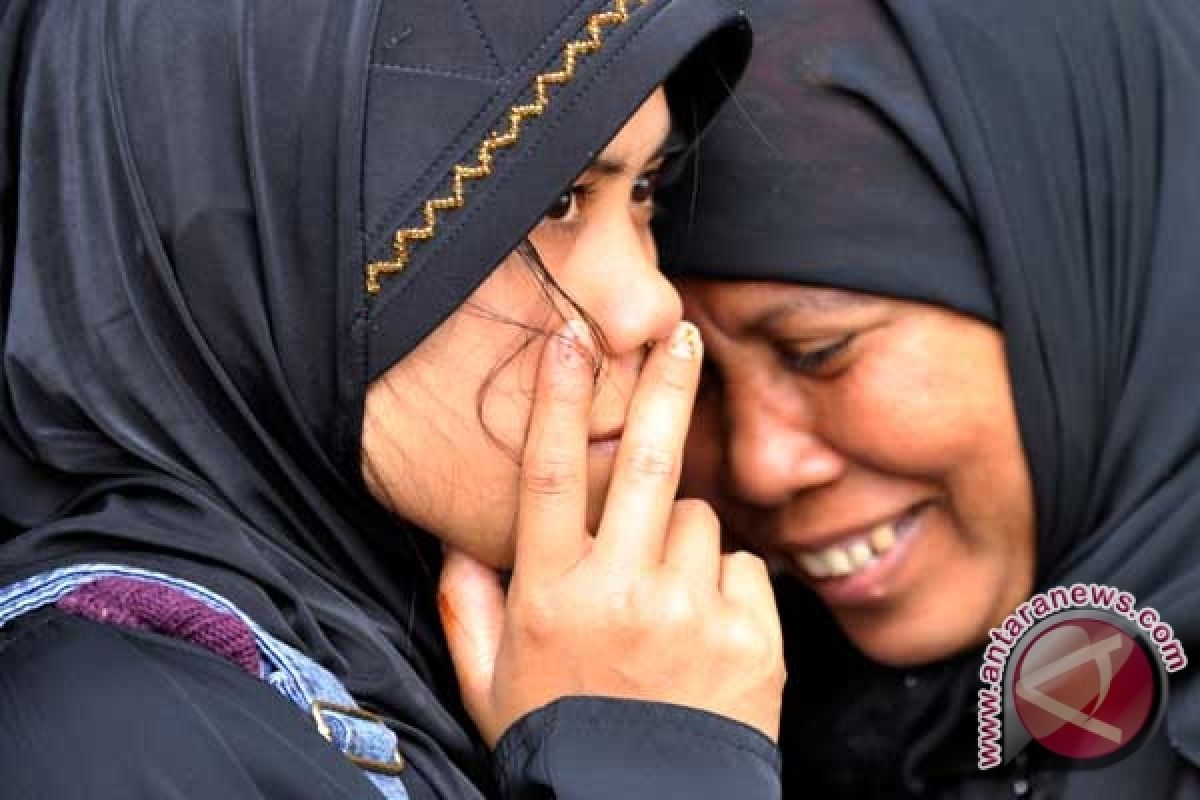A team led by Muhammad Maftuh Basyuni, the head of the Task Force on the Protection of Indonesian Migrant Workers, will leave for Saudi Arabia on October 16, 2011, to lobby certain parties in the Middle Eastern country in order to obtain legal relief for the seven workers.
The seven people are currently facing execution after being sentenced to death for murder.
Basyuni, former religious affairs minister, and his team members will lobby among others the families of the victims, the Institute of Forgiveness and Peace for Disputing Parties, and the Governor of Mecca.
He said Indonesia respects the law in that country and does not wish to interfere in the implementation of the law in that country. He said however that Islam gives an opportunity for the family of a murder victim to give a pardon.
The four-member team consisting of Lisna Yoeliana Poeloengan, Benny Partiwanggono and Ramon Andrias, who are also members of the task force, will stay in Saudi for a week for the special mission. Alwi Sihab, former foreign affairs minister and the deputy chief of the task force, had already left for Saudi Arabia.
Basyuni hoped that Alwi Sihab had already met Saudi Deputy Foreign Minister Abdullah Asiz bin Abdullah and the latter would be able to convey Alwi`s message to the Saudi King.
President Susilo Bambang Yudhoyono had twice already requested the Saudi King to spare their lives. The Indonesian foreign ministry, through the Indonesian ambassador to Saudi Arabia, had also tried several ways to ask for the pardon including from the victims` families.
In fact, 43 Indonesians have been implicated in crimes punishable by death in Saudi Arabia and 24 of them have already been sentenced to death while the cases of 19 others are still under investigation.
Of the 24 who have been sentenced to death, six have received a pardon while five others have their sentences reviewed, six others are awaiting a pardon from the king because their cases are related to hypnotism, and the remaining seven are awaiting the critical decision of whether they would get a pardon or not.
In order to improve protection of Indonesian workers following increasing legal cases involving them so far, the government had decided to temporarily stop sending domestic workers to Saudi Arabia as of August 1, 2011.
And in a quick response to the government?s moratorium, the Saudi kingdom had declared stop issuing visas for Indonesian workers as of June 30, 2011, a month before the moratorium was imposed.
Several non-governmental organizations (NGOs) grouped in The Alliance of Civilians Against the Death Penalty, have urged the government to save the lives of several migrant workers and in particular Tuti Tursilawati, who is on death row for murdering her employer`s father.
The NGOs joining the Alliance included Kontras, Migrant Care, Imparsial, ELSAM, ANBTI, ICW, KWI, Demos, and Wahid Institute.
Tuti Tursilawati (27 years old) originally from Cikeusik village, West Java, left for Saudi Arabia on Sept 5, 2009 and was placed as a caregiver for her employer`s father. She was arrested and sentenced to death in 2010 for murdering her employer`s father.
There was no information about her motive, but according to the vice chairman of the Indonesian Migrant Workers Union (SBMI), Ramses D Arman recently, Tuti was raped by her employer`s father before she killed him.
Until now, officials from the Indonesian consulate general in Jidda are still trying to save Tuti from execution by lobbying the victim`s family to forgive her.
Tuti`s position was critical because she had confessed to all the charges. The decision for the implementation of her death penalty had been approved and now in the hands of the governor of Mecca, Maftu Basyuni said, adding that Tuti had been charged of killing her employer and stealing her employer`s possessions.
He said the government and the task force had done everything to save her, and the foreign minister through the Indonesian ambassador to Saudi had also taken efforts including meeting the governor of Mecca and the governor of Thoif and other agencies concerned for it.
With regard to Satinah, Basyuni said that she was also facing a critical moment, as she had been four years in Al Qasim jail for killing her employer.
He said efforts had also been to spare her from death including a meeting between the task force chief and the son of the victim in the middle of July initiated by the governor Al Qosim.
The embassy recently received information that the family of the victim agreed to pardon her with a compensation of 10 million riyals.
About Zainab who has been more than 10 years in Madinah jail and sentenced to death for killing her employer Mahtuf said that the family of the victim had decided to refuse to pardon her until the employer`s child now still 13 years old becomes an adult two of three years later to be asked for his opinion on it.
Aminah and Darmawati are facing a death penalty for killing Indonesian citizens and mutilated their bodies. The families of the victims had given a pardon and therefore they could be spared from qishosh, he said.
However because what they had done was considered very cruel the local court decided to sentence them to death. "We have tried and are trying to ask the king to give them sentence reduction, spare them from death," he said.
Executive Director of Migrant Care Anis Hidayah said in Jakarta on October 14, that President Susilo Bambang Yudhoyono must conduct high-level diplomacy with the Saudi King to save Tuti Tursilawati from execution.
The government should be able to tell Saudi Arabia to stop executing Indonesian nationals, he said.
According to Anis, the United Nations had asked the Saudi government to impose a moratorium and abolish the death penalty after beheading eight Bangladeshi migrant workers.
"If the government is serious in its diplomacy, I think it will receive international supports," Anis said.
"The issue of migrant workers must not be considered trivial. The government must pay attention to the fate of the migrant workers on death row," Anis said.
Deputy Speaker of the House of Representatives (DPR) Priyo Budi Santoso, speaking to the press at the Parliament`s press room, in Jakarta, on October 14, expressed his shock that around 218 migrants workers are currently facing execution after being sentenced to death.
Of the 218 workers, 151 are in Malaysia, 43 in Saudi Arabia, 22 in China and two in Singapore.
The lawmaker suggested that the government provide lawyers as early as possible for migrant workers facing legal problems.
"For the costs of obtaining lawyers to give legal advises, the government could propose a budget to the DPR, and we will make sure that the DPR will approve the proposal," he said.
Priyo said he was happy that the government had set up a task for on the protection of migrant workers. However, he felt sad because the task force could not move forward as expected.
"We want the task force to move ahead of the problems being faced," he said.
The Deputy House Speaker also urged President Yudhoyono to stop sending female migrant workers to countries that don`t provide legal protection for housemaids.
Priyo supported the establishment of a Parliamentary Caucus on Migrant Workers Protection at the parliament building on October 14, 2011.
The caucus was initiated by among others Rieke Dyah Pitaloka (a legislator from DPR`s Commission IX), Ledia Hanifah (Commission IX), Riski Sadig (Commission IX), Hernani Hurustiati (Commission IX), Budi Supriyanto (Commission IX), Teguh Juwarno (Commission I), and Eva Sundari (Commission III).
The new caucus should be supported, encouraged and guarded so it could work in synergy with a team set up by the DPR, he said.
"Similar caucuses also exist in parliaments of other countries sending migrant workers overseas," Rieke said, adding the caucus is expected to help find comprehensive solution to the migrant worker problems.
Around 4.32 million Indonesian men and women are forced to work overseas, especially in Malaysia, Saudi Arabia, Gulf countries, Singapore, Taiwan, and Hong Kong, due to poverty and inadequate numbers of jobs in the country.
Foreign Affairs Minister Marty Natalegawa told the Parliament last June that a total of 303 Indonesian migrant workers had been threatened with the death penalty overseas over the past 20 years. The government had managed to help at least 12 of them escape the death penalty, the minister said.
(T.F001/HAJM/A014)
Reporter: by Fardah
Editor: Priyambodo RH
Copyright © ANTARA 2011












